频率副词
6个频率副词用法口诀
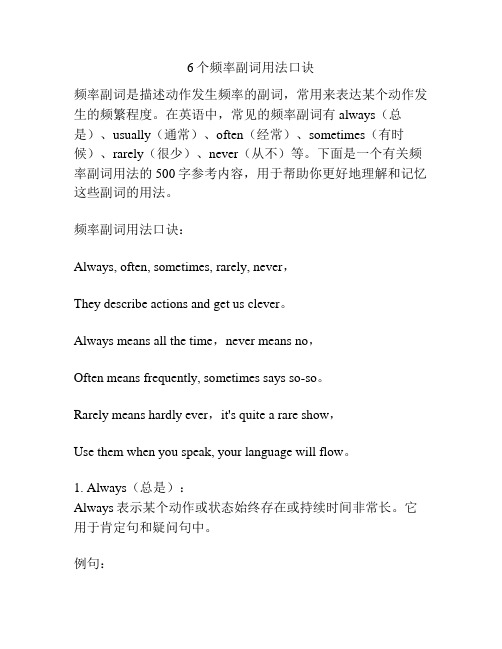
6个频率副词用法口诀频率副词是描述动作发生频率的副词,常用来表达某个动作发生的频繁程度。
在英语中,常见的频率副词有always(总是)、usually(通常)、often(经常)、sometimes(有时候)、rarely(很少)、never(从不)等。
下面是一个有关频率副词用法的500字参考内容,用于帮助你更好地理解和记忆这些副词的用法。
频率副词用法口诀:Always, often, sometimes, rarely, never,They describe actions and get us clever。
Always means all the time,never means no,Often means frequently, sometimes says so-so。
Rarely means hardly ever,it's quite a rare show,Use them when you speak, your language will flow。
1. Always(总是):Always表示某个动作或状态始终存在或持续时间非常长。
它用于肯定句和疑问句中。
例句:- She always wears a hat when she goes out.她出门时总是带着帽子。
- Do you always eat breakfast before work?你上班前总是吃早餐吗?2. Often(经常):Often表示某个动作或状态频繁地发生。
它在肯定句中的位置通常在行为动词之前,be动词之后。
例句:- I often go to the gym after work.我经常下班后去健身房。
- They often play basketball on weekends.他们经常在周末打篮球。
3. Sometimes(有时候):Sometimes表示某个动作或状态偶尔发生,不是经常性的。
频度副词

频度副词
1.概念
频度副词是用来表示动作发生频率的词,常用来表示不确定时间,主要包括always, usually, often, sometimes, hardly, ever, never等,如果表示具体频度次数,可采用次数加单位时间。
例如:
once a week 一周一次
twice a month 每月两次
2.常用频度副词的区别
(1)always 意为“总是,永远”,表示频度最高。
(2)usually意为“通常”,即很少有例外,多用于一般现在时。
(3)often意为“经常”,在频度上不如usually那么频繁。
(4)sometimes意为“有时,偶尔”。
(5)hardly ever 意为“几乎不,很少”,表示否定意义。
(6)never 意为“从来没有,绝不”,表示否定意义。
以上几个频度副词所表示的频度,从高到低为:
always→usually→often→sometimes→hardly ever→never
3.频度副词在句子中的位置
在句子中,频度副词常放在实意动词前面,be动词、情态动词和助动词后面。
例如:
He always helps others.他总是帮助别人。
4.对句子中频度副词进行提问,用“how often”。
例如:
He sometimes watches TV.(对划线部分提问)
How often does he watch TV?。
频率副词
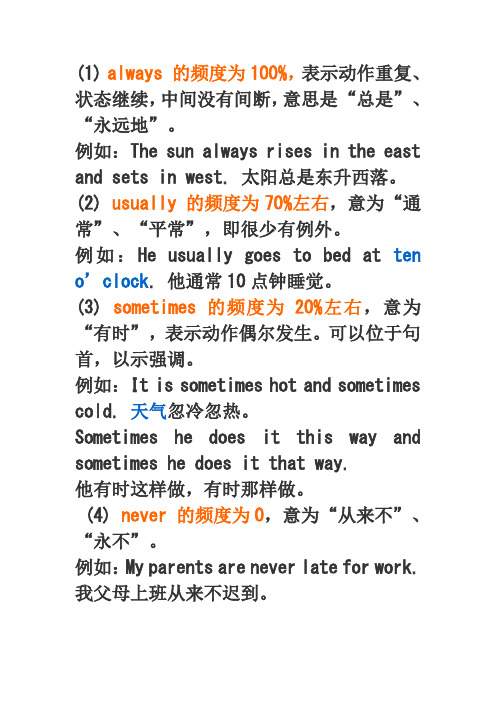
(1) always 的频度为100%,表示动作重复、状态继续,中间没有间断,意思是“总是”、“永远地”。
例如:The sun always rises in the east and sets in west. 太阳总是东升西落。
(2) usually 的频度为70%左右,意为“通常”、“平常”,即很少有例外。
例如:He usually goes to bed at ten o’clock. 他通常10点钟睡觉。
(3) sometimes 的频度为20%左右,意为“有时”,表示动作偶尔发生。
可以位于句首,以示强调。
例如:It is sometimes hot and sometimes cold. 天气忽冷忽热。
Sometimes he does it this way and sometimes he does it that way.
他有时这样做,有时那样做。
(4) never 的频度为0,意为“从来不”、“永不”。
例如:My parents are never late for work. 我父母上班从来不迟到。
频率副词用法
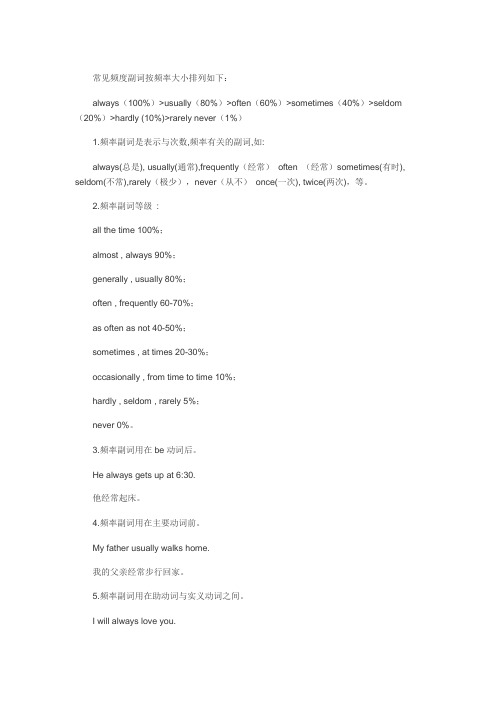
常见频度副词按频率大小排列如下:always(100%)>usually(80%)>often(60%)>sometimes(40%)>seldom (20%)>hardly (10%)>rarely never(1%)1.频率副词是表示与次数,频率有关的副词,如:always(总是), usually(通常),frequently(经常)often (经常)sometimes(有时), seldom(不常),rarely(极少),never(从不)once(一次), twice(两次),等。
2.频率副词等级:all the time 100%;almost , always 90%;generally , usually 80%;often , frequently 60-70%;as often as not 40-50%;sometimes , at times 20-30%;occasionally , from time to time 10%;hardly , seldom , rarely 5%;never 0%。
3.频率副词用在be动词后。
He always gets up at 6:30.他经常起床。
4.频率副词用在主要动词前。
My father usually walks home.我的父亲经常步行回家。
5.频率副词用在助动词与实义动词之间。
I will always love you.我将永远爱你。
6.频率副词用在ought to之间。
You ought often to write to your mother.你应该常给你母亲写信。
7.在答句中,频率副词必须放在前。
Do you often go there你常去那里吗(误)Yes, I do often.是的,我常去。
(正)Yes, I often do.是的,我常去。
(从不), seldom(很少,不常)用于句首时,句子要用形式以加强语气。
英语中的频率副词
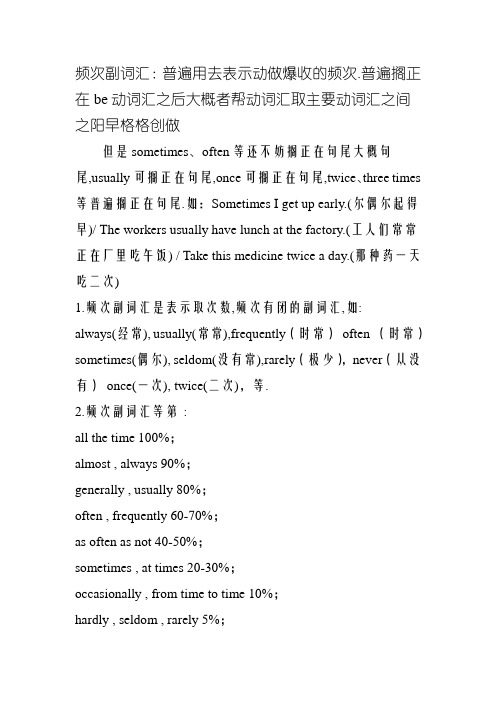
频次副词汇:普遍用去表示动做爆收的频次.普遍搁正在be动词汇之后大概者帮动词汇取主要动词汇之间之阳早格格创做但是sometimes、often等还不妨搁正在句尾大概句尾,usually可搁正在句尾,once可搁正在句尾,twice、three times 等普遍搁正在句尾.如:Sometimes I get up early.(尔偶尔起得早)/ The workers usually have lunch at the factory.(工人们常常正在厂里吃午饭) / Take this medicine twice a day.(那种药一天吃二次)1.频次副词汇是表示取次数,频次有闭的副词汇,如:always(经常), usually(常常),frequently(时常)often (时常)sometimes(偶尔), seldom(没有常),rarely(极少),never(从没有)once(一次), twice(二次),等.2.频次副词汇等第:all the time 100%;almost , always 90%;generally , usually 80%;often , frequently 60-70%;as often as not 40-50%;sometimes , at times 20-30%;occasionally , from time to time 10%;hardly , seldom , rarely 5%;never 0%.3.频次副词汇用正在be动词汇后.He always gets up at 6:30.他时常六面半起床.4.频次副词汇用正在主要动词汇前.My father usually walks home.尔的女亲时常步止回家.5.频次副词汇用正在帮动词汇取真义动词汇之间.I will always love you.尔将永近爱您.6.频次副词汇用正在ought to之间.You ought often to write to your mother.您该当常给您母亲写疑.7.正在问句中,频次副词汇必须搁正在帮动词汇前.Do you often go there?您常去何处吗?(误)Yes, I do often.是的,尔常去.(正)Yes, I often do.是的,尔常去.8.never(从没有), seldom(很少,没有常)用于句尾时,句子要用倒拆形式以加强语气.Never have I been there.尔从已去过何处.Seldom do I watch TV.尔很少瞅电视.频次副词汇位子影象心诀:be后真动前帮主间对于频次提问用how often大概how many times。
频率副词的使用用法
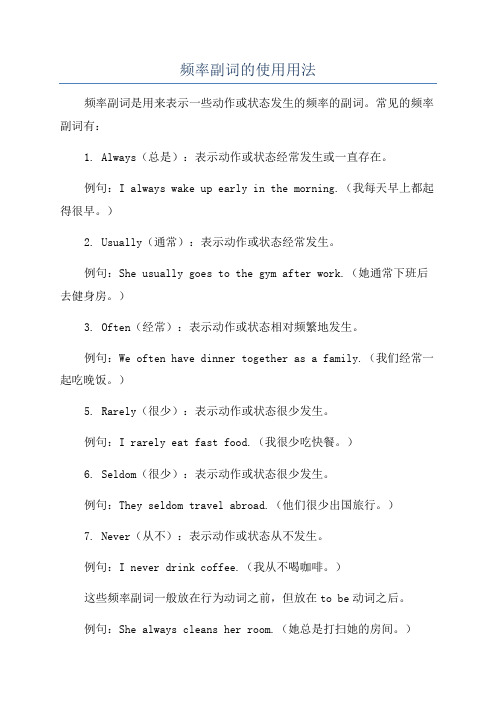
频率副词的使用用法
频率副词是用来表示一些动作或状态发生的频率的副词。
常见的频率副词有:
1. Always(总是):表示动作或状态经常发生或一直存在。
例句:I always wake up early in the morning.(我每天早上都起得很早。
)
2. Usually(通常):表示动作或状态经常发生。
例句:She usually goes to the gym after work.(她通常下班后去健身房。
)
3. Often(经常):表示动作或状态相对频繁地发生。
例句:We often have dinner together as a family.(我们经常一起吃晚饭。
)
5. Rarely(很少):表示动作或状态很少发生。
例句:I rarely eat fast food.(我很少吃快餐。
)
6. Seldom(很少):表示动作或状态很少发生。
例句:They seldom travel abroad.(他们很少出国旅行。
)
7. Never(从不):表示动作或状态从不发生。
例句:I never drink coffee.(我从不喝咖啡。
)
这些频率副词一般放在行为动词之前,但放在to be动词之后。
例句:She always cleans her room.(她总是打扫她的房间。
)
He is never late for work.(他上班从不迟到。
频度副词
频度副词1.频度副词:表示动作发生间隔(既频率)的副词。
它们有:always ; usually ; often ; sometimes ;seldom ; hardly ever ; never 等。
2. how often意为“多久一次”,用来提问在某一段时间内进行某个动作的频率。
其回答通常是often、sometimes、never、hardly ever、always、once a day、once a week等等表示频率的副词或是短语。
例: --- She hardly ever watches TV. (划线提问)--- How often does she watch TV例句理解:1. —What do you usually do on weekends—I often go to the movies.2. —How often do you shop—I shop once a week.3. — How often does she exercise—She exercises every day.3.频度副词:表示频率不确定频率短语表示频率确定(1)不确定的频度副词always(100%)> usually(约80%~90%)> often(约60%)> sometimes(约30%)> seldom(约20%)> hardly ever(约10%)> never(0%)(2)表示确定的频率短语every day/week/month/year 每天/周/月/年 once a week 每周一次twice a week 每周两次 twice a month 一月两次three times a day 一天三次注:三次或三次以上一般用“基数词+times”表示。
(3)在句中位置:频度副词在句中通常放在be动词、助动词、情态动词之后,在实义动词之前。
例:She is often late for school.I can never be sure.He always helps me.课堂巩固练习:一、对划线部分提问1)He always plays basketball after school._______ does he always _______ after school2) They hardly ever play football._______ _________ ________ they play football二、单项选择( ) 1. ---How often ______ she exercise ---Twice a week.A. doB. doesC. doingD. did( ) 2. I ______ like to drink milk.A. notB. doesn’tC. don’tD. no( ) you go swimming ---Sometimes.A. How oftenB. How longC. how manyD.How old( )4. Katrina watches TV once ______ week.A. aB. theC. anD. ﹨知识扩展:1. how long多久(用来提问有多长时间)回答通常是more than two weeks、for a week、ten years等表示一段时间的状语。
频率副词及短语
详细描述
时间副词如“以前”、“之后”、“现在” 等表示动作发生的时间点或时间段,而频率 副词则表示动作发生的次数或频繁程度。例 如,“他每天去跑步”中的“每天”是频率 副词,表示动作“跑步”发生的次数;而“ 他明天去跑步”中的“明天”则是时间副词
,表示动作“跑步”发生的时间点。
注意与程度副词的区分使用
详细描述
通过翻译包含频率副词及短语的句子,学生可以提高语言运用能力,更好地理解和表达 动作发生的频率,同时也能增强对英语语言结构的认识。
写作练习:使用频率副词及短语描述日常行为
总结词
培养写作表达能力
详细描述
学生可以通过写作练习,使用频率副词及短 语描述日常行为,例如“我每天早上六点起 床”、“我通常在晚上十点睡觉”等,以培 养写作表达能力,使描述更为准确和生动。
很少(seldom)
总结词
表示动作或状态很少发生。
详细描述
这个词表示一种较低的频率,强调某动作或状态很少发生。例如,“他很少在周末工作”表示他在周 末工作的次数很少。
通常不(usually not)
总结词
表示大多数情况下不发生某个动作或 状态。
详细描述
这个词表示一种否定的频率,强调某 动作或状态在大多数情况下不会发生 。例如,“他通常不抽烟”表示他大 多数情况下不抽烟。
03 频率副词及短语的用法
表示动作发生的频率
每天
每周
每月
每年
表示某个动作每天都会 发生。
表示某个动作每周发生 一次。
表示某个动作每月发生 一次。
表示某个动作每年发生 一次。
表示状态持续的频率
01
02
03
04
一直
表示某种状态持续不断,没有 中断。
频率副词用法
常见频度副词按频率大小排列如下:always(100%)>usually(80%)>often(60%)>sometimes(40%)>seldom (20%)>hardly (10%)>rarely never(1%)1.频率副词是表示与次数,频率有关的副词,如:always(总是), usually(通常),frequently(经常)often (经常)sometimes(有时), seldom(不常),rarely(极少),never(从不)once(一次), twice(两次),等。
2.频率副词等级:all the time 100%;almost , always 90%;generally , usually 80%;often , frequently 60-70%;as often as not 40-50%;sometimes , at times 20-30%;occasionally , from time to time 10%;hardly , seldom , rarely 5%;never 0%。
3.频率副词用在be动词后。
He always gets up at 6:30.他经常六点半起床。
4.频率副词用在主要动词前。
My father usually walks home.我的父亲经常步行回家。
5.频率副词用在助动词与实义动词之间。
I will always love you.我将永远爱你。
6.频率副词用在ought to之间。
You ought often to write to your mother.你应该常给你母亲写信。
7.在答句中,频率副词必须放在助动词前。
Do you often go there你常去那里吗(误)Yes, I do often.是的,我常去。
(正)Yes, I often do.是的,我常去。
8.never(从不), seldom(很少,不常)用于句首时,句子要用倒装形式以加强语气。
频率副词的实用指南
频率副词的实用指南频率副词在英语中扮演着非常重要的角色,它们用来描述事件发生的频率或者频率的高低。
掌握频率副词的使用对于提高英语表达的准确性和流畅性非常重要。
本文将为您介绍一些常用的频率副词,帮助您在日常生活和学习中更好地运用它们。
1. Always(总是)"Always"是用来表示某种行为或事件经常发生的频率副词。
比如:She always gets up early.(她总是早起。
)2. Often(经常)"Often"表示某种行为或事件经常发生,但不如"always"那么频繁。
比如:I often go to the gym.(我经常去健身房。
)3. Sometimes(有时候)"Sometimes"表示某种行为或事件偶尔发生,不是很频繁。
比如:She sometimes watches movies on weekends.(她有时候周末看电影。
)4. Rarely(很少)"Rarely"表示某种行为或事件很少发生,频率非常低。
比如:He rarely eats fast food.(他很少吃快餐。
)5. Never(从不)"Never"表示某种行为或事件从不发生。
比如:I never drink coffee in the evening.(我晚上从不喝咖啡。
)6. Frequently(频繁地)"Frequently"表示某种行为或事件经常发生,比"often"更强调频率。
比如:He frequently travels for business.(他经常出差。
)7. Occasionally(偶尔)"Occasionally"表示某种行为或事件时不时发生,程度比"sometimes"稍微频繁一些。
- 1、下载文档前请自行甄别文档内容的完整性,平台不提供额外的编辑、内容补充、找答案等附加服务。
- 2、"仅部分预览"的文档,不可在线预览部分如存在完整性等问题,可反馈申请退款(可完整预览的文档不适用该条件!)。
- 3、如文档侵犯您的权益,请联系客服反馈,我们会尽快为您处理(人工客服工作时间:9:00-18:30)。
频率副词:
一般用来表示动作发生的频率。
往往放在句子中间,实义动词之前,非实义动词之后;非实义动词分为1 系动词be.2 助动词帮助动词构成时态(do,does,will,shall,have,had,has).3 情态动词(must,can,may)。
除此之外,都叫做实义动词。
1..频率副词用在be动词后。
He always gets up at 6:30.
他经常六点半起床。
2.频率副词用在主要动词前。
My father usually walks home.
我的父亲经常步行回家。
3.频率副词用在助动词与实义动词之间。
I will always love you.
我将永远爱你。
4,频率副词位置记忆口诀:be后
实动前
助主间
对频率提问用how often或how many times
IV. 頻率副詞的問句:
頻率副詞的原問句,使用How Often…..。
例1. A: How often do you go shopping at the supermarket? B: I sometimes go shopping ○
there.
2. My father often drives me to school. How often does your father drive you to school?
*牛刀小試*
A:你時常打籃球嗎?B:不,我沒有時常打。
但我有時候會游泳。
永遠當個好學生。
絕對不要在上課時說話。
A:你叔叔多久去一次美國?B:他每年去那裡兩次。
我奶奶時常去購物,但我爺爺有時候才去。
频率副词专练
1. I __ ate vegetables before, but now I __ eat them because they are good for our health . (用often, seldom填空)
2. Simon goes running every day and he is ____ healthy. (用never, always填空)
3. lunch, we, a hamburger, have, sometimes, for (连词成句)
_________________________
4. Andy always has meat for dinner. (变否定
句) Andy ______ _____ _____ meat for dinner.
5. He doesn’t often go to the park. (改为肯定句)He _____ ______ to the park.
6. Sandy seldom plays badminton (就划线部分提问)
____ ___ ____ Sandy ____ badminton?
7. I eat noodles three times a week. (同上)___________________________
8. We often have milk and eggs for breakfast. (同上)__ __ you __ __ for breakfast?
9. Sometimes he ____ (watch) TV in the evening.
10. My sister never play soccer. (改错)
Attention1.练习:用正确的特殊疑问词和Be动词填空
Example:What’s your name? My name is Frank.
1.__________ Guangzhou? It’s in Guangdong.
2._________ your birthday? It’s in June.
3.__________ your teacher? My teacher is Ms.Zhou.
4.__________ a rose? A rose is a flower.
5.__________ you late? I’m late because of traffic.
6. __________ your parents? They’re in my country.
7.__________ you? I’m fine. And you?
8.__________the teacher’s office? It’s in the second floor.
9.__________ the restrooms? They are at the end of the hall.
10._________ Labor Day in China? It’s in May.
11.__________we here? We are here because we want to learn English.
12. __________ the weather today? It's cloudy and cool.
二.how long的用法
how long有以下两个主要意思:
1. 表示多长时间,主要用来对一段时间(如three days, four weeks 等)提问。
如:
A:How long did he stay here? 他在这儿呆了多久?
B:About two weeks. 大约两个星期。
A:How long does it take to get to London from here? 从这里到伦敦要多长时间?
B:At least ten hours. 至少要10个小时。
2. 表示某东西有多长。
如:
A:How long is the river? 这条河有多长?
B:About 500 km. 大约500千米。
二、how often的用法
how often 指每隔多久,主要用来对频度副词或状语(如:once a week, three times a month 等)提问。
如:
A:How often does he come here? 他(每隔)多久来一次?
B:Once a month. 每月一次。
A:How often do you visit your mother? 你多长时间看你妈妈一次?
B:Once a week. 一周一次。
how soon的用法
how soon 指再过多久,主要用来对表示将来的一段时间(如:in an hour, in two weeks 等)提问。
如:
A:How soon will he be back? 他要多久才回来?
B:In an hour. 1 小时以后。
A:How soon shall we know the results? 我们多久能知道结果?
B:I don’t know. 我不知道
How far 的用法
A:How far is your home from your school?
B: My home is two kilometers away from my school.
attention 2:
for有很多种用法:1. 表示“当作、作为”。
如: I like some bread and milk for breakfast. 我喜欢把面包和牛奶作为早餐。
What will we have for supper? 我们晚餐吃什么? 2. 表示理由或原因,意为“因为、由于”。
如: Thank you for helping me with my English. 谢谢你帮我学习英语。
Thank you for your last letter. 谢谢你上次的来信。
Thank you for teaching us so well. 感谢你如此尽心地教我们。
3. 表示动作的对象或接受者,意为“给……”、“对…… (而言)”。
如: Let me pick it up for you. 让我为你捡起来。
Watching TV too much is bad for your health. 看电视太多有害于你的健康。
4. 表示时间、距离,意为“计、达”。
如: I usually do the running for an hour in the morning. 我早晨通常跑步一小时。
We will stay there for two days. 我们将在那里逗留两天。
5. 表示去向、目的,意为“向、往、取、买”等。
如: Let’s go for a walk. 我们出去散步吧。
I came here for my schoolbag.我来这儿取书包。
I paid twenty yuan for the dictionary. 我花了20元买这本词典。
